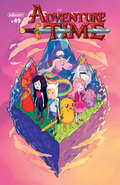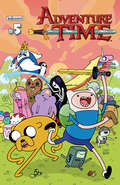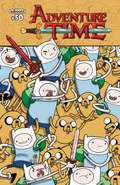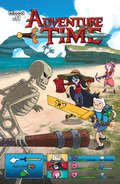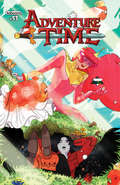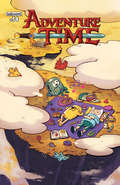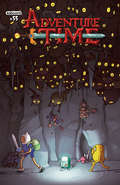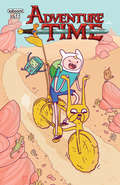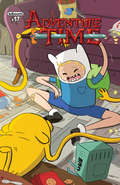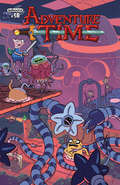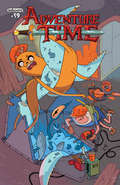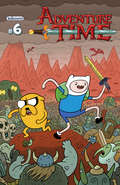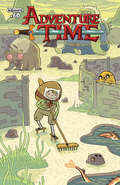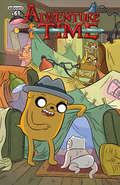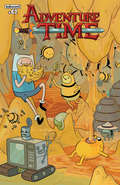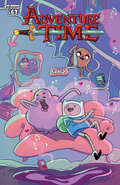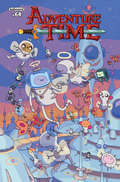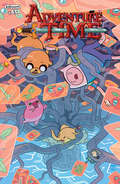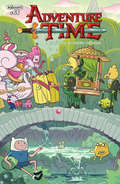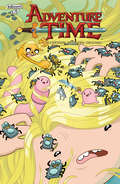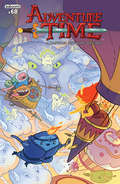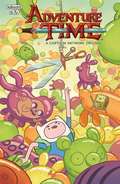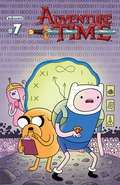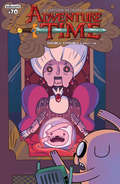- Table View
- List View
Adventure Time (Planet of the Apes #49)
by Pendleton Ward<p>Finn and Jake must re-banish their old friend from reality in order to defeat a monstrous threat. <p>This is a fixed-format ebook, which preserves the design and layout of the original print book.</p>
Adventure Time (Planet of the Apes #5)
by Pendleton Ward<p>Don't miss the beginning of the new arc of this totally rhombus series! The totally sick gang of Finn, Jake, Marceline, Princess Bubblegum, and the Ice King are back in this new arc of the incredibly popular all-ages series! You won't want to miss this ultra-awesome issue that kicks off a brand-new storyline! Featuring a back-up story by Paul Pope! <p>This is a fixed-format ebook, which preserves the design and layout of the original print book.</p>
Adventure Time (Planet of the Apes #50)
by Pendleton Ward<p>This special oversized one-shot issue introduces new series artist Ian McGinty (Welcome to Showside, Bravest Warriors)! Finn takes a tour of his past lives when he astral projects through an old photo album. Features special incentive covers by the original Adventure Time art team, Shelli Paroline & Braden Lamb, and Jeffrey Brown (Darth Vader and Son)! <p>This is a fixed-format ebook, which preserves the design and layout of the original print book.</p>
Adventure Time (Planet of the Apes #51)
by Pendleton Ward<p>After too many back-to-back quests, Jake and Finn disagree on how important doing this hero stuff really is. <p>This is a fixed-format ebook, which preserves the design and layout of the original print book.</p>
Adventure Time (Planet of the Apes #52)
by Pendleton Ward<p>In the ghost realm, Jake is met with some pretty familiar challenges to overcome. <p>This is a fixed-format ebook, which preserves the design and layout of the original print book.</p>
Adventure Time (Planet of the Apes #53)
by Pendleton Ward<p>Jake successfully fools King Ghost of the ghost realm and must escape with the cure for Finn, but could this have been a ruse all along to teach Jake a lesson? <p>This is a fixed-format ebook, which preserves the design and layout of the original print book.</p>
Adventure Time (Planet of the Apes #54)
by Pendleton Ward<p>Finn and Jake are sheriff and deputy of a wild west town...or are they? Is this even real?! <p>This is a fixed-format ebook, which preserves the design and layout of the original print book.</p>
Adventure Time (Planet of the Apes #55)
by Pendleton Ward<p>Finn and Jake discover that it's not just them, everyone in Ooo is trapped in their own little realities! <p>This is a fixed-format ebook, which preserves the design and layout of the original print book.</p>
Adventure Time (Planet of the Apes #56)
by Pendleton Ward<p>Finn and Jake look for BMO in order to break free of the fantasies they're trapped in! <p>This is a fixed-format ebook, which preserves the design and layout of the original print book.</p>
Adventure Time (Planet of the Apes #57)
by Pendleton Ward<p>Finn and Jake make it to the core of BMOWORLD and confront the real culprit behind this mess! <p>This is a fixed-format ebook, which preserves the design and layout of the original print book.</p>
Adventure Time (Planet of the Apes #58)
by Pendleton Ward<p>Finn decides to become a dungeon master like his father figure Joshua was! <p>This is a fixed-format ebook, which preserves the design and layout of the original print book.</p>
Adventure Time (Planet of the Apes #59)
by Pendleton Ward<p>Finn finds his current adventure to be a bit more than he expected, but he's getting really into it. It's kind of like how someone approaches taking over their basement with a model train set. <p>This is a fixed-format ebook, which preserves the design and layout of the original print book.</p>
Adventure Time (Planet of the Apes #6)
by Pendleton Ward<p>THE FUN WILL NEVER END IN THIS HOT ALL-AGES SERIES! The awesome adventures of Finn, Jake, Marceline, Princess Bubblegum and the Ice King continue in the latest issue of this critically-acclaimed, on-going series! Demand is high for this 'new all-ages classic' with the first issue going to a 3rd printing and the 2nd issue in its second printing, order early so you don't miss out! <p>This is a fixed-format ebook, which preserves the design and layout of the original print book.</p>
Adventure Time (Planet of the Apes #60)
by Pendleton Ward<p>Finn gets into the dungeon-making scene and meets fellow dungeon masters, some of whom are villains from Finn's past! <p>This is a fixed-format ebook, which preserves the design and layout of the original print book.</p>
Adventure Time (Planet of the Apes #61)
by Pendleton Ward<p>Finn becomes a bit obsessed with building his perfect dungeon, losing the plot a bit, and toys with terrible and great evil forces to build his ideal dungeon understand Joshua better through dungeoncraft. <p>This is a fixed-format ebook, which preserves the design and layout of the original print book.</p>
Adventure Time (Planet of the Apes #62)
by Pendleton Ward<p>A contest is started to see who is the best Princess in all of Ooo! <p>This is a fixed-format ebook, which preserves the design and layout of the original print book.</p>
Adventure Time (Planet of the Apes #63)
by Pendleton Ward<p>The Princess competition continues with everyone trying to do their best despite the prankster trying to ruin their fun. <p>This is a fixed-format ebook, which preserves the design and layout of the original print book.</p>
Adventure Time (Planet of the Apes #64)
by Pendleton Ward<p>The Best Princess Ever is finally going to be chosen! Who will it be? And will the prankster finally reveal themselves before they ruin the whole event? <p>This is a fixed-format ebook, which preserves the design and layout of the original print book.</p>
Adventure Time (Planet of the Apes #65)
by Pendleton Ward<p>It's finally time to decide who is the best princess ever! <p>This is a fixed-format ebook, which preserves the design and layout of the original print book.</p>
Adventure Time (Planet of the Apes #66)
by Pendleton Ward<p>It's a hot air balloon adventure! Finn and Jake decide to take their questing to the sky in this new arc from novelist Delilah S. Dawson (Ladycastle)! <p>This is a fixed-format ebook, which preserves the design and layout of the original print book.</p>
Adventure Time (Planet of the Apes #67)
by Pendleton Ward<p>The epic trip around the world continues with everyone trying to find what they need to keep their hot air balloons afloat! <p>This is a fixed-format ebook, which preserves the design and layout of the original print book.</p>
Adventure Time (Planet of the Apes #68)
by Pendleton Ward<p>The hot air balloon battle takes a twist as Finn and Jake fight to get to the last statue. <p>This is a fixed-format ebook, which preserves the design and layout of the original print book.</p>
Adventure Time (Planet of the Apes #69)
by Pendleton Ward<p>As the balloon race comes to an end, Princess Bubblegum finally gets to the bottom of what is going on! <p>This is a fixed-format ebook, which preserves the design and layout of the original print book.</p>
Adventure Time (Planet of the Apes #7)
by Pendleton Ward<p>JOIN JAKE THE DOG AND FINN THE HUMAN AS THE HOTTEST ALL-AGES COMIC BOOK ON THE STANDS CONTINUES! The totally mathematical adventure continues in this latest time-bending issue of ADVENTURE TIME! <p>This is a fixed-format ebook, which preserves the design and layout of the original print book.</p>
Adventure Time (Planet of the Apes #70)
by Pendleton Ward<p>Double Troubles, Part 1 of 4! Finn and Jake take the day off from adventuring to enjoy a new carnival, where a witch offers to make them free doubles, twice the Finn and Jake fun! <p>This is a fixed-format ebook, which preserves the design and layout of the original print book.</p>
